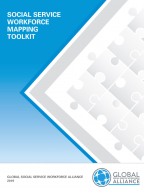Peer Networking and Capacity Building for Child Protection Professionals – Lessons from “ChildHub”
Child protection systems across the global South suffer from common problems, one of the most critical among which is low number and skills of relevant professionals to deliver services. Additionally, child protection professionals are often demotivated, uncoordinated and isolated, with limited access to continuous training and support. Peer learning and capacity building networks help address these issue, and often leverage the spread and scope of information and communications technologies.

